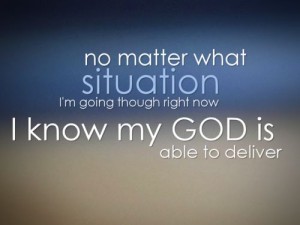2 Timothy 1: 1-14
Norman B. Bendroth
 We often think that the great saints of Christian history were never plagued with worry or anxiety. Martin Luther, that robust, bold reformer, who defied the corrupt church of his day and said, “Here I stand, I can do no other,” comes to mind. Yet historians tell us Luther had severe bouts of depression. One day he was in his melancholia, pacing the floors and sighing. His wife, Katie von Bora, came into the room completely dressed in black, took a seat in the rocker and began to knit. Martin turned to her and said, “Katie, why are you in black.” She responded, “Oh, didn’t you know? God is dead.” “Don’t be silly,” he laughed, “God isn’t dead. God’s the everlasting, inexhaustible one. God isn’t dead.” And she looked at her worry-bound husband and gave him a look as only wives can do and said, “By the way you¬’re carrying on you’d think God was dead.” From that day on Luther made a prom¬ise to himself that he would not act in such a way.
We often think that the great saints of Christian history were never plagued with worry or anxiety. Martin Luther, that robust, bold reformer, who defied the corrupt church of his day and said, “Here I stand, I can do no other,” comes to mind. Yet historians tell us Luther had severe bouts of depression. One day he was in his melancholia, pacing the floors and sighing. His wife, Katie von Bora, came into the room completely dressed in black, took a seat in the rocker and began to knit. Martin turned to her and said, “Katie, why are you in black.” She responded, “Oh, didn’t you know? God is dead.” “Don’t be silly,” he laughed, “God isn’t dead. God’s the everlasting, inexhaustible one. God isn’t dead.” And she looked at her worry-bound husband and gave him a look as only wives can do and said, “By the way you¬’re carrying on you’d think God was dead.” From that day on Luther made a prom¬ise to himself that he would not act in such a way.
We are like Martin Luther. We make wonderful professions of faith on Sunday mornings in our hymns and prayers about the great abilities of God, but when the crunch comes we act like practical atheists. We act like God is unable to do what God has promised. Do you know there are some 3,000 promises in scripture and this is one of them? Most of us don’t know 10 of them. And most of us have hardly experienced 6 of them. And what are the promises for? To keep you from worry. God knows how we’re made. That’s why so many promises start out with, “fear not.” Then reasons are given why we shouldn’t fear. Most of us are marvelous at worry. The Bible says worrying is a sin, because at the moment of worrying I’m not trusting. At the moment of trusting, I’m not worrying. Some of you might say, “Oh, I’m an expert. I can do both at once.” But you know from experience, that’s not true.
God intends us to live a life of freedom from worry; not freedom from concern, not a complacency, where I couldn’t care less about anything. That’s being irresponsible. There’s a world of difference between having a concern and being anxious. To have a concern that you take to God in prayer is one thing, but to be nervous about the outcome is another. Now, how can we live in a world of absolute uncertainty and yet be certain that our times are in God’s hands? Boy that’s a tough one, isn’t it? We often don’t know the way and stumble along in the dark. We often have only a rough map drawn on a napkin, if that. Be we don’t have to know the way or at least the whole way. We have to walk with God. God knows where we’re going and will never lead us astray; that doesn’t mean there won’t be detours or bumps in the road, but God is leading us somewhere. Knowing that, you can face the unknown future with greater confidence, not in your¬self, but in God.
That is really Paul’s point when writing to young Timothy in our NT lesson this morning. Paul knows he hasn’t much longer to live. This is the last letter he wrote. We’re not sure how much longer he lived; maybe a year, maybe less. He tells Timothy, “I am already being poured out like a drink offering, and the time has come for my departure,” (4:6). Paul is saying, “As I look back over my life, Timothy, I want you to know I have fought the good fight, I have finished the race, and I have kept the faith. Now there is in store for me the crown of righteousness, which the Lord, the righteous judge, will award me on that day–and not only to me, but also to all who have longed for Christ’s appearing” (4: 7-8). It’s as if Paul were saying, I know it’s the end of the road for me (he was ultimately beheaded by the Roman Empire.) Timothy. I know at last I’m go¬ing to see Jesus face to face. But you’ve still got a long way to run. I want you to remember your roots and the road you’re traveling. I want to share some¬thing of my experience with you.”
 You never get the spirit of fear from God. Will you remember that? We’re not talking about a holy awe and reverence for God’s presence. That’s a fear or respect we should always have. What I’m talking about is a fear that has terror in it, the fear that has panic in it, and the fear that takes away faith, the fear that chills the spine. God has not given us this spirit of fear. We may all feel afraid at times, but to live with a spirit of fear, that never comes from God. John says, “There is no fear in love. Perfect love casts out fear.” But I also know the opposite: “Fear casts out all love.” I want you to remember that.
You never get the spirit of fear from God. Will you remember that? We’re not talking about a holy awe and reverence for God’s presence. That’s a fear or respect we should always have. What I’m talking about is a fear that has terror in it, the fear that has panic in it, and the fear that takes away faith, the fear that chills the spine. God has not given us this spirit of fear. We may all feel afraid at times, but to live with a spirit of fear, that never comes from God. John says, “There is no fear in love. Perfect love casts out fear.” But I also know the opposite: “Fear casts out all love.” I want you to remember that.
There is a lot of anxiety and fear in this congregation right now. People are concerned about attendance being down, Sunday school floundering, giving being down, etc. And when people are anxious or uncomfortable, they want to find someone or something to blame. So they scapegoat the pastor, or blame the Stewardship Committee, or those people who aren’t committed to the church and stopped coming. But you know what, it’s never a straight line of cause and effect. Churches have emotional force fields like families do and when they feel out of whack they push back to try to make things the way they were even if those weren’t healthy ways of being. It’s par for the course after about 9 months people are either content with the process and how it’s going, a lot of people are sitting on the fence, and a small percentage carry the anxiety and stir the pot. It’s also a given that between 5 to 13% look for another church after a long term pastor leaves for a host of reasons. Attendance goes down on average about 12% a year. And it doesn’t matter who the interim pastor is.
So remember that. God didn’t give us a spirit of fear. But I’ll tell you what God did give us. Paul tells Timothy: “For God did not give us a spirit of timidity, but a spirit of power, of love and of self-discipline (or a sound mind, clear thinking)” (17).
That’s what faith is for. Faith is given that we might believe in the absolute faithfulness of God. God is reliable, dependable, and trustworthy. “Great is Thy faithfulness, Lord unto me.” That’s why the apostle can say, I know the one in whom I am believing.” I know this God,” he says, “and this God is utterly reliable. And because I know this God I am convinced.” The KJV translates this so well. It says,” I am persuaded.” Are you absolutely persuaded and convinced of this truth like Paul is?
In the face of this time of transition either in this church, in your life, in our world (and we are always in transition) Paul says, “I know God so well. I’ve trusted God through the years. I’ve come to such an appreciation of God, that I know my God is able.” Isn’t that a marvelous reassurance: my God is able? That’s all you need. It’s present and it’s continuous. Paul doesn’t say God was able, or God will be able, or God might be able, or God could be able, but God is able. God’s not incapacitated by time. God hasn’t lost the touch. The author of Hebrews said that Jesus Christ is “the same yesterday, today and tomorrow.” Will you remember that during this time of transition and uncertainty? Our God is able.
But it’s not always so with us, is it? Once we were able and now we might not be as able. I do serious back country hiking. I’ve hiked the Weminuch Wilderness at what’s known as the four corners: Colorado, Arizona, New Mexico and Utah. It’s a rigorous hike over the Continental Divide twice, up 14,000 mountains, scrambling rock slides and crossing streams. When I did it I was ten years younger, in great shape, and still stupid enough to do stuff like this. It was exhilarating. My daughter used to call me a gazelle.
Last summer I did the toughest trail in the South Rim of the Grand Canyon. It was my fifth trip to the Canyon and I knew what I was doing. But it was on the Royal Arch trail I met my match. It involved hike an ancient creek bed, sliding down boulders, going through rabbit holes, rappelling down a wall of red wall stone. I was in shape, but this time I took a slip once and sprained my ankle holding on with my finger nails looking at a 300 foot drop below me.
Another time I was rock hopping at the end of the day when I was tired and next think I knew I was flat on my back. Fortunately, there was not drop off. You see, once I was able, now I’m not as able as I once was. I was popping ibuprofen like candy. I would roll over in bed and groan. My wife would ask, “What’s wrong?” “Oh nothing, just a little muscle pull,” when in reality I wanted her to remove my spine.
Because God is able that is why Paul doesn’t urge partial commitment. He says, I have committed,” not “that which I’m going to commit, which I ought to commit, which I should have committed, which I am thinking about committing.” It’s the perfect tense. I have committed.” Paul committed every¬thing: his life, his future, his all. Then he says, I rest happily. I don’t know what the future holds. I don’t have to. I don’t have all the answers to my problems. I don’t know what difficulties there may be. But I do know this: what¬¬ever the difficulty is, I’m not facing it alone. Whatever the problem, I don’t face it alone. Whatever path I go on, I don’t travel alone. I know God in Christ will be with me until the very end. I know the one in whom I am believing. I’m convinced. I’m persuaded. God is able to keep what I’ve committed to God.”
 Paul says, “I know this one, and my God is able.” What is Paul convinced that God is able to do? God is able “to guard what I have en¬trusted to him.” What you give to God to keep, what you ask God to keep, what you hand over to God to keep, God is able to keep. And may I point out, that this scripture is not saying God is able to keep what you haven’t entrusted to God. You will find that what you hand over to God rarely becomes an area of worry. But what you hold onto and don’t commit to God will always be an area of worry. Suppose you say, “I’ll give God every area of my life except my finances. I can handle those myself.” I’ll tell you, expect your worries and problems to be about money. Whatever you choose to hold onto, mark my words that will be your problem area. Could be money, work, family, marriage, gambling—even your church. That is what you will worry about. But what¬ever you hand over to God, you’ll find God will take you through, over and over and over again.
Paul says, “I know this one, and my God is able.” What is Paul convinced that God is able to do? God is able “to guard what I have en¬trusted to him.” What you give to God to keep, what you ask God to keep, what you hand over to God to keep, God is able to keep. And may I point out, that this scripture is not saying God is able to keep what you haven’t entrusted to God. You will find that what you hand over to God rarely becomes an area of worry. But what you hold onto and don’t commit to God will always be an area of worry. Suppose you say, “I’ll give God every area of my life except my finances. I can handle those myself.” I’ll tell you, expect your worries and problems to be about money. Whatever you choose to hold onto, mark my words that will be your problem area. Could be money, work, family, marriage, gambling—even your church. That is what you will worry about. But what¬ever you hand over to God, you’ll find God will take you through, over and over and over again.
You see, faith isn’t something you can measure. You’ve no idea how much faith you’ve got until it’s tested. You’ll probably discover it’s much less than you thought. Have you ever gone to God and said, “Lord, will you do this?” God says, “Well, how much faith do you have?” You say, “Well, I measured it this morning, Lord, and I’ve got about a pint and a half.” “I’m sorry,” God says, “you’re going to need a gallon for this request.” How do you measure faith? Who says whether you’ve got enough? When did Jesus ever say to anybody, “Go back and get enough faith?” No, this passage isn’t asking us to work up a wonderful, amazing, staggering faith, but it is asking us to place our faith, what little it may be, in a wonderful, amazing, staggering God. I don’t need a wonderful faith in God. I need faith in a wonderful God. Let us say with Paul, with real confidence, “I know whom I have believed, and am convinced that he is able to guard what I have entrusted to him for that day.”
